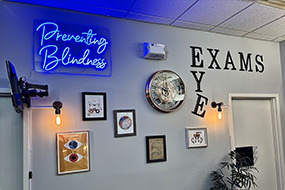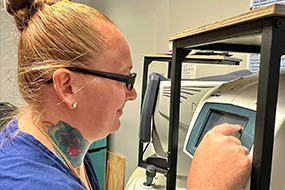
As the years go by, it is normal to notice changes in your eyesight. Vision tends to evolve gradually, and many of these changes are a natural part of aging. While some shifts may be mild or expected, others can signal more serious eye health concerns. Understanding how your eyes change over time is the first step in protecting your vision and maintaining quality of life as you age.
Common Age-Related Changes in Vision
• Presbyopia (difficulty seeing up close): One of the earliest signs of aging vision is the gradual loss of near vision, often beginning in your 40s. This condition, known as presbyopia, occurs when the lens of the eye becomes less flexible, making it harder to focus on close objects like books or phone screens. Many people find themselves reaching for reading glasses or switching to multifocal lenses as a result.
• Reduced tear production: Dry eyes become more common with age as tear production naturally slows. This can cause discomfort, irritation, blurred vision, and an increased risk of eye infections.
• Decreased night vision: Aging eyes may struggle with low-light conditions due to changes in the retina and a slower pupil response to light. This can make nighttime driving or seeing in dim environments more challenging.
• Color perception changes: Colors may appear duller or less vibrant. This happens as the lens of the eye becomes slightly yellow, affecting how we see certain shades, especially blues and greens.
• Increased sensitivity to glare: Older adults often become more sensitive to glare from sunlight or headlights. This can be a result of changes in the lens or the development of cataracts.
Age-Related Eye Conditions to Watch For
While some vision changes are normal with age, others can signal more serious conditions that require medical attention. These include:
• Cataracts: Clouding of the lens that can interfere with clear vision
• Glaucoma: Damage to the optic nerve, often associated with high eye pressure
• Macular degeneration: A disease that affects central vision, making it hard to read or recognize faces
• Diabetic retinopathy: A complication of diabetes that damages the blood vessels in the retina
Why Regular Eye Exams Are So Important
Many serious eye conditions develop gradually and may not show noticeable symptoms until they are advanced. Scheduling regular comprehensive eye exams, depending on your risk factors and age is essential. Eye exams can detect early signs of vision issues, monitor changes in eye health, and help preserve your sight for years to come. Even if you think your vision is fine, an eye exam may uncover problems that only a trained optometrist can detect.
Take Control of Your Vision Today
Aging is a natural part of life, and while some changes in vision are expected, staying proactive about your eye health can make a major difference. Whether you are starting to notice small shifts in how you see or simply want to stay ahead of potential problems, regular eye exams are a smart and essential step.
Schedule your comprehensive eye exam with Doc Eye to stay ahead of age-related eye conditions before they impact your vision. Visit our office in Waterford, Connecticut, or call (860) 499-3500 to book an appointment today.


















